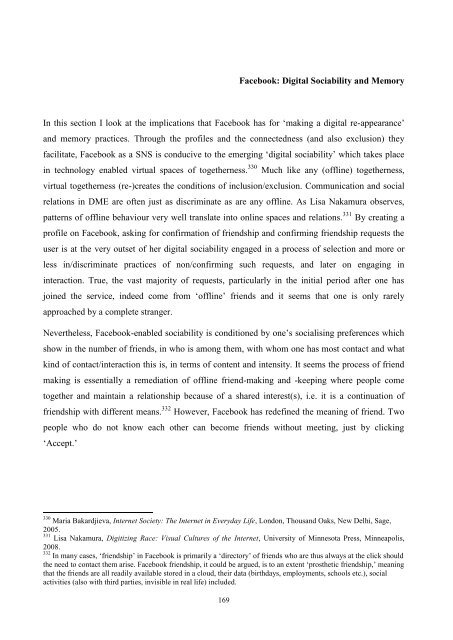UNIVERSITY OF NOVA GORICA GRADUATE SCHOOL ...
UNIVERSITY OF NOVA GORICA GRADUATE SCHOOL ...
UNIVERSITY OF NOVA GORICA GRADUATE SCHOOL ...
You also want an ePaper? Increase the reach of your titles
YUMPU automatically turns print PDFs into web optimized ePapers that Google loves.
Facebook: Digital Sociability and Memory<br />
In this section I look at the implications that Facebook has for ‗making a digital re-appearance‘<br />
and memory practices. Through the profiles and the connectedness (and also exclusion) they<br />
facilitate, Facebook as a SNS is conducive to the emerging ‗digital sociability‘ which takes place<br />
in technology enabled virtual spaces of togetherness. 330 Much like any (offline) togetherness,<br />
virtual togetherness (re-)creates the conditions of inclusion/exclusion. Communication and social<br />
relations in DME are often just as discriminate as are any offline. As Lisa Nakamura observes,<br />
patterns of offline behaviour very well translate into online spaces and relations. 331 By creating a<br />
profile on Facebook, asking for confirmation of friendship and confirming friendship requests the<br />
user is at the very outset of her digital sociability engaged in a process of selection and more or<br />
less in/discriminate practices of non/confirming such requests, and later on engaging in<br />
interaction. True, the vast majority of requests, particularly in the initial period after one has<br />
joined the service, indeed come from ‗offline‘ friends and it seems that one is only rarely<br />
approached by a complete stranger.<br />
Nevertheless, Facebook-enabled sociability is conditioned by one‘s socialising preferences which<br />
show in the number of friends, in who is among them, with whom one has most contact and what<br />
kind of contact/interaction this is, in terms of content and intensity. It seems the process of friend<br />
making is essentially a remediation of offline friend-making and -keeping where people come<br />
together and maintain a relationship because of a shared interest(s), i.e. it is a continuation of<br />
friendship with different means. 332 However, Facebook has redefined the meaning of friend. Two<br />
people who do not know each other can become friends without meeting, just by clicking<br />
‗Accept.‘<br />
330 Maria Bakardjieva, Internet Society: The Internet in Everyday Life, London, Thousand Oaks, New Delhi, Sage,<br />
2005.<br />
331 Lisa Nakamura, Digitizing Race: Visual Cultures of the Internet, University of Minnesota Press, Minneapolis,<br />
2008.<br />
332 In many cases, ‗friendship‘ in Facebook is primarily a ‗directory‘ of friends who are thus always at the click should<br />
the need to contact them arise. Facebook friendship, it could be argued, is to an extent ‗prosthetic friendship,‘ meaning<br />
that the friends are all readily available stored in a cloud, their data (birthdays, employments, schools etc.), social<br />
activities (also with third parties, invisible in real life) included.<br />
169

















